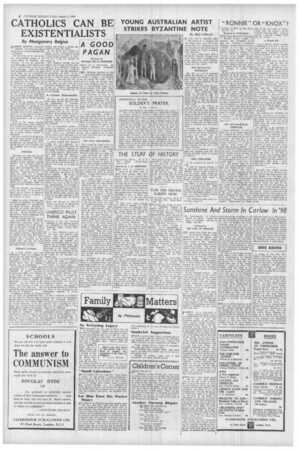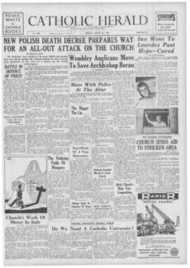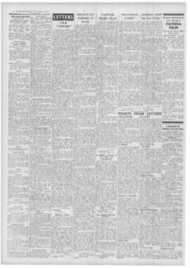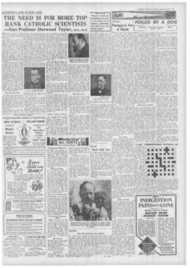Page 6, 12th August 1949
Page 6

Report an error
Noticed an error on this page?If you've noticed an error in this article please click here to report it.
Tags
Share
Related articles
Unless Ye Become . • .
Good Company Indeed
Mgr. Knox's Translation
Suppdr4ac's Longest Engagement
The Knox Version Of The Bible
" RONNIE" OR "KNOX"?
Englishing the Bible, by Mgr. Knox. (B.O.W., 5s.) Reviewed by IVOR HAEL
THE Right Reverend Monsignor A' Ronald Knox, author of Absolute and Abitophell, of at least one " limerick," a spiritual Apologia, several detective stories, a treatise on The Mass in Slow Motion, and one on the "Creed " similarly considered, wonders if he will go down to posterity as " Ronnie" or as " Knot." 1 don't think that he need worry. " Moffatt said this, Knox said that " — but Moffatt, as far as I know, has only one great string to his bow, and I don't suppose that his best friends ever thought of calling him " Johnny "!
The fact is that we love our modest Monsignor in all his aspects. Age, which he now shyly welcomes, cannot wither nor custom stale his infinite variety—and holy priests bless him when he is frivolous! This makes it difficult to criticise him when he is ferociously serious, because he gets very " angry " with people who " like" him and don't " like " his Bible—or bits thereof!
In this attractive and ingenuous collection of " talks " and articles, he tells the world how he set about the great achievement of his lifpand, to paraphrase a well-worn proverb, an obscure critic feels like the feline which exercises its traditional privilege of gazing upon the splendours of royalty. One would like to " purr "—the French would say " roltrormer" — but one is tempted to " miaow," if not to unsheath velvet paw!
THE NON-TECHNICAL APPROACH I am no technician. I would not know how to go about translating an " imperfect (or was it a future?) into an aorist which may or may not be gnomic," and then into " a perfect which may or may not be the ' perfect with have '." 1 want an " English" Bible which will not gather dust on my bookshelf. As I read it I have the Vulgate at the back of my mind. I remember that young David refused armour because he wasn't used to wearing it — and I don't like a paraphrase about not having strength to walk in an " un wonted array." I also have the "A.V." still further back in my mind, and I am disappointed when Ruth asks Naomi not to " press " her to "go back." The "pale" horse of the Apocalypse has associations somehow heightened by Durer's uncoloured print, but entirely destroyed by " cream-white" —which suggests Banbury Cross!
As I recited my office this very day, I came across that Divine message which was to make " both" ears " tingle," but which has merely become " such a doom as shall ring in the ears." When I read this week's instalment of what, I fear, I must call " Knox," I read: "There sat the King," " Out went the golden sceptre." " Deep drank the King," and all the new turns ot phrase which alter the familiar versions without improving them. I said to myself: " The old is better "—even the old " Douai "!
A PLAIN P.P.
I am no Biblical scholar—no Bird or BulIough to buzz like an amiable bee about the blossoms of Hebraic thought. I am just a plain parish priest closely connected with theman-in-the-street who, like myself, wants a readable version of the Sacred Scriptures.
We both speak about "bowels of compassion." And we bless the " fruit " of Our Lady's " womb." So. in his " New Teitament," does Mgr. Knox—though the metaphor is hardly " English." "What would an Englishman have said to express the same?" In Welsh we say ffrwyth dy groth du, and we know exactly what we mean.
I once overheard two English railwaymen crossing the " tracks" at Ottawa, " T'es a wonderful even ing," said one. "Aye," said the
other, " t'es writ, seed-time and 'arvest shall not fail '." There was no " harvest " in sight, but I knew what he meant. Oser the corpse of my grandfather, a Welsh Methodist deacon said: " Behold an Israelite indeed in whom is no guile." Yet none of us thought he meant "a perfect old Jew." And " guile " (dolus) is a better "English " word than " falsehood."
One could go on " mopping and mowing " a la Byron—or, il you prefer, miaowing and even scratching as the palace cat probably did wnen discovered; hut I feel we should rather take this great effort at its own evaluation.
In replying to the criticisms of Dr. Bird, Mgr. Knox has made it plain that he does not intend to preserve a faithful rendering of the original texts. He gives an " artist's portrait" rather than a " faithful likeness" which spares nothing. It is. in many parts, an illuminating impression of what the texts meant rather than what they said—but, like all subjective impressions, it is personal — and, as we should expect from the author of The Mass in Slow Motion, very personal indeed. Every reader of the new " Old Testament " should read this amusing and enlightening little book — which helps one to love " Ronnie" and to revere Knox.
Summula „furls Publici Ecclesiastici, by Fr. F. M. Marchesi, S.J. (M. d'Auria, Publishers to the Holy See, Naples), is a text book, conforming to scholastic method, and in its language, on one of the most important studies not only for the priest but also for the layman, in these days of the accepted secular state and the persecuting totalitarian• tyranny. There is a good case to be made for ensuring that books on the public rights and laws of the Church are more widely available even at text book level than they can be in Latin.
blog comments powered by Disqus









